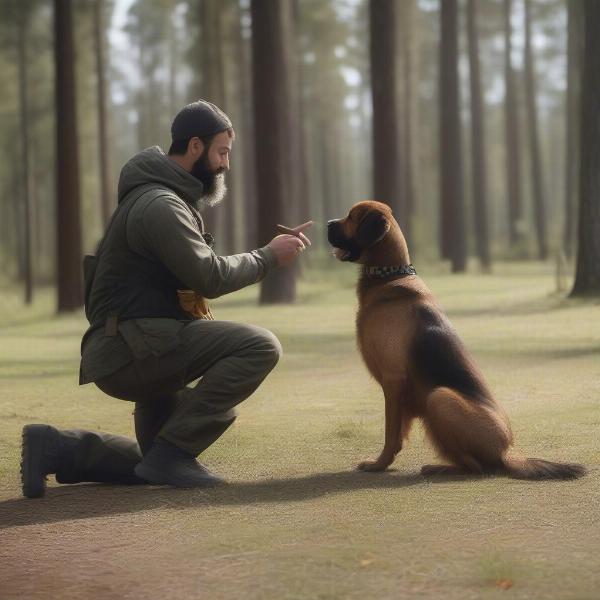The Bearded Hunting Dog, also known as the Griffon Nivernais, is a rugged and charismatic breed with a rich history in hunting. These loyal and intelligent dogs are gaining popularity beyond their traditional hunting roles, appealing to active families who appreciate their unique personality and devotion. This guide will delve into everything you need to know about the Bearded Hunting Dog, from breed characteristics and care to training and health considerations.
Understanding the Bearded Hunting Dog Temperament
Bearded Hunting Dogs are known for their courageous and determined nature, traits honed over centuries of working alongside hunters. They are intelligent and eager to please, which makes them receptive to training, though their independent streak can sometimes present a challenge. This breed thrives on activity and requires a significant amount of exercise to stay happy and healthy. Their affectionate and playful nature makes them wonderful family companions, especially for those with an active lifestyle. Are they good with children? Generally yes, but early socialization is crucial, as is supervised interaction, especially with younger children. Remember, their hunting instincts can sometimes lead them to chase small animals.
Bearded Hunting Dog Care and Health
Caring for a Bearded Hunting Dog involves attention to their physical and mental wellbeing. Their distinctive wiry coat requires regular brushing to prevent matting and tangles. Like all breeds, regular veterinary check-ups are essential to maintain their health. What health issues are common in Bearded Hunting Dogs? While generally a healthy breed, they can be prone to hip dysplasia and certain eye conditions. A reputable breeder will screen their dogs for these potential problems. Ensuring your dog receives a balanced diet and plenty of exercise will contribute significantly to their overall health and longevity.
Training Your Bearded Hunting Dog
Training a Bearded Hunting Dog can be both rewarding and challenging. Their intelligence and eagerness to please make them quick learners, but their independent nature requires patience and consistency. Positive reinforcement methods work best with this breed. Early socialization is vital to ensure they develop into well-adjusted adults. Exposing them to a variety of people, places, and situations from a young age will help them become confident and well-behaved companions. Is it difficult to train a Bearded Hunting Dog? Not necessarily, but their strong hunting instincts require a firm but gentle hand. Consistency and positive reinforcement are key to success.
 Bearded Hunting Dog training with its owner
Bearded Hunting Dog training with its owner
Finding a Bearded Hunting Dog Breeder
If you’re considering adding a Bearded Hunting Dog to your family, finding a responsible breeder is paramount. A reputable breeder will prioritize the health and temperament of their dogs. They will be knowledgeable about the breed and happy to answer your questions. What should I ask a breeder? Inquire about health testing, parentage, and the socialization practices they employ. Visiting the breeder’s facility and meeting the parent dogs is highly recommended. This allows you to assess the environment the puppies are raised in and get a sense of their temperament.
Is a Bearded Hunting Dog Right for You?
The Bearded Hunting Dog is a unique breed that requires a specific type of owner. Their high energy levels and need for mental stimulation mean they are not suited to apartment living or sedentary lifestyles. Do Bearded Hunting Dogs bark a lot? They can be vocal, especially when excited or alerting their family to something. If you’re looking for a loyal, intelligent, and active companion, and are prepared to meet their specific needs, the Bearded Hunting Dog could be a perfect fit for your family.
Conclusion
The Bearded Hunting Dog is a fascinating breed with a rich history and a devoted following. Their intelligence, loyalty, and unique personality make them a rewarding companion for the right owner. By understanding their specific needs and providing them with the proper care, training, and environment, you can enjoy a long and fulfilling relationship with this extraordinary breed.
FAQ
- How much exercise does a Bearded Hunting Dog need? They require a significant amount of daily exercise, including long walks, runs, or hikes.
- Are Bearded Hunting Dogs good with other dogs? Early socialization is crucial, but they can generally get along well with other dogs.
- What is the average lifespan of a Bearded Hunting Dog? Their average lifespan is 10-12 years.
- Do Bearded Hunting Dogs shed a lot? They shed moderately. Regular brushing will help minimize shedding and keep their coat healthy.
- Are Bearded Hunting Dogs easy to groom? Their wiry coat requires regular brushing to prevent matting.
- What is the best type of training for a Bearded Hunting Dog? Positive reinforcement methods work best.
- Where can I find a reputable Bearded Hunting Dog breeder? Contact breed-specific rescue organizations or national kennel clubs for referrals.
ILM Dog is a leading international pet website dedicated to providing expert advice on dog care and breeding. We offer a comprehensive range of resources, covering everything from breed selection and health care to training and nutrition. Our team of experienced writers and dog experts are committed to providing accurate, practical, and up-to-date information to help you provide the best possible care for your canine companion. For further information on dog breeds, health, training, nutrition, grooming, products, and accessories, contact us via email at [email protected] or phone at +44 20-3965-8624. Visit ILM Dog for more expert advice and resources.